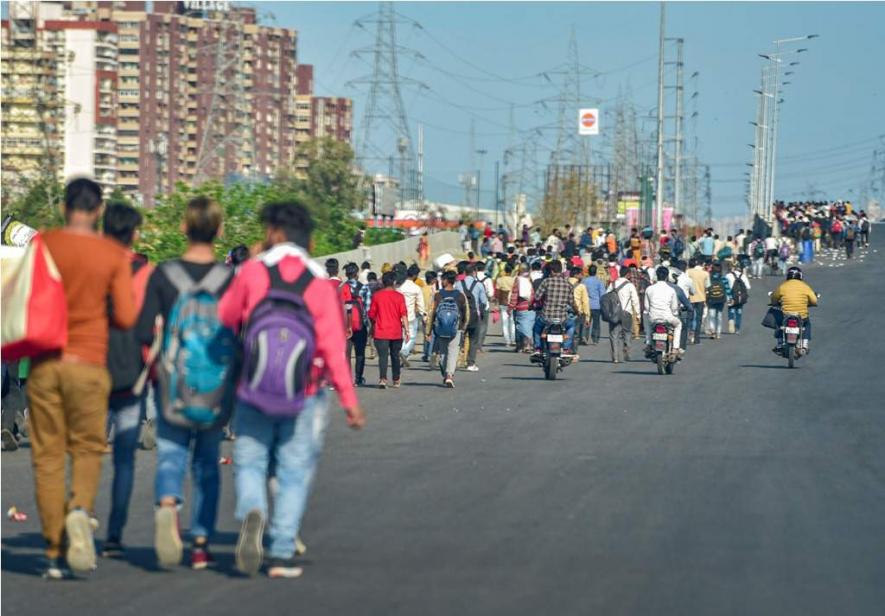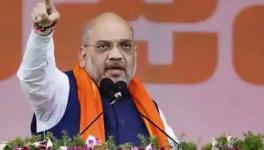Covid-19 and Politics in the Home State of Migrant Workers

Image Courtesy: Edexlive
While political commentators in India and abroad are of the view that the initial mishandling of the Covid-19 epidemic by the United States President Donald Trump has sealed his fate in the coming November election there, hardly anyone is guessing how the pandemic will make or break the prospects of Bihar chief minister Nitish Kumar, though the state is likely to vote in October-November this year.
As there is no other Assembly poll scheduled in the next six months, the one in Bihar will provide an opportunity to test the mood of the people in the—hopefully—post-Covid-19 days. With the Bharatiya Janata Party-led National Democratic Alliance in power at both the Centre and the state, this election may be a new kind of challenge to all parties and formations.
The Rashtriya Janata Dal, the main Opposition party, was the first to leap into the pandemic situation. At 9 PM on 5 April its leader and former chief minister Rabri Devi and her older son Tej Pratap Yadav stood outside their bungalow with lanterns in both hands. The lantern, of course, is the election symbol of the RJD. Party workers and supporters from all over the state mimicked their leader. In a way, the RJD tried to hit two birds with one stone: it never is opposed to the Prime Minister’s call and yet tried to score political brownie points over his party, the BJP.
In the world after Covid-19, it is unlikely that the CAA, NRC and NPR triad, or the NDA’s claim that it will provide “sushasan” or good governance, are going to be election issues that will resonate with the people.
In the aftermath of the Novel Coronavirus scourge, the whole country can expect rampant unemployment. In Bihar in particular, etched in people’s memories, perhaps forever, will be the mistreatment of stranded migrant labourers who made a long journey on foot or in trains and buses, to reach home to escape the terrible rigours of the lockdown. But when they returned, they faced utter neglect in the immediate post-lockdown days. The total collapse of the healthcare system is also likely to become an election issue.
These lockdown-related woes will only add to the anger over the sheer apathy shown by the government of Bihar headed by Chief Minister Nitish Kumar when, for more than a fortnight, the posh colonies of Patna were waterlogged. The same was the case when a large number of children died last summer in Muzaffarpur and adjoining districts of north Bihar because of the Acute Encephalitis Syndrome. This, at least, is something that may be raised by the rival camps.
Until a month back, many political pundits had been predicting the return to power of Kumar. They were coming to the conclusion simply on the ground that there was no experienced leader in the Opposition camp who could hold different parties together and put up a big fight. Now, even these analysts are not sure how the political scene will progress.
The fact, however, is that Kumar has never been comfortably since he switched sides and returned to the NDA fold in July 2017. The Janata Dal United (JDU) and BJP have repeatedly lost by-elections, both for the Lok Sabha and in the Assembly.
The NDA gained confidence after it swept the 2019 parliamentary poll, winning 39 out of 40 seats in the state. But that was a different sort of electoral battle, where the NDA did very well even in the three states—Madhya Pradesh, Rajasthan and Chhattisgarh—although the BJP had lost power in them only in December 2018. Hence, it is not definite that the verdict in Assembly polls will go the Lok Sabha way.
But Covid-19 exposes another faultline of the man in power. It is that the biggest problem with Nitish Kumar is that he is not a crisis man.
Be it the deaths in Muzaffarpur, the man-made disaster in Patna last monsoon or the spread of Covid-19, and the mass reverse-migration into Bihar, the CM is not being perceived as proactive in instilling confidence among masses or in the administrative machinery. He has certainly been issuing directions, conducting video-conferences, meeting with administrators and so on, and, with other states, he has demanded a fund infusion from the Centre to tackle this crisis, but consider the note struck by case of Kerala Chief Minister Pinarayi Vijayan, West Bengal Chief Minister Mamata Banerjee, and Delhi Chief Minister Arvind Kejriwal as a direct contrast. Albeit to different degrees, all these leaders hit the streets and started communicating with ordinary citizens even as they directed bureaucrats and consulted experts from day one. But Kumar, chief minister of a state that is among the biggest suppliers of migrant labourers to the country, rarely directly speaks to people.
Political activists are beginning to think that Kumar has been practising social distancing much before Prime Minister Narendra Modi’s first speech on 19 March—he has been alert to the hazards of anyone coughing and sneezing around him. Though such tales might be apocryphal, the fact is Kumar relies on hand-picked top bureaucrats to run the state, and prefers to only give timely directions from time to time.
Not just natural calamities; one can say it is not his style to visit places which have witnessed tumultuous events. On 1 June 2012, the Ranvir Sena chief Brahmeshwar Singh “Mukhiyaji” was murdered. Thousands of his supporters went on a warpath. There was arson and looting on the 70-km route from Ara, where he was killed, to Patna, where he was cremated. Kumar, then visiting Bhagalpur, did not rush back to Patna despite the prevailing anarchy.
Arguably, this episode is from a past long gone, but his state’s lethargic response to Covid-19 will still be fresh in people’s minds when they vote in a few months. It is also a fact that the NDA-led government at the Centre has not come out in shining colours from its handling of the crisis. As the devastation caused by the pandemic will have much greater economic ramifications for Bihar, things are unlikely to remain the same politically. For these reasons, this episode is likely to impact the poll prospects of the NDA.
No doubt people will also compare Kumar’s style of functioning with that of his arch-rival Lalu Prasad Yadav closer to the polls. The latter’s governance was what it was, but Lalu had the reputation of rising to the occasion in times of crisis; be it riots, massacres, or natural calamities. He was often among the first to reach a spot. Perhaps this is political tokenism—and symbolism can fade before recollections of the poor shape the state’s systems were in while he was in power. But the coming election will certainly test voter’s perceptions of a leader who is present, versus one who appears to be from centre-stage.
When Kumar came to power in November 2005 Bihar had received generous doses of fund infusions from the Centre, where the Manmohan Singh government was in power, in which Lalu was the Railway Minister. This provided Nitish an opportunity to take up big construction projects such as roads, bridges, new schools, police stations, hospitals, convention centres and so on. But he has failed to improve the administrative machinery. Be it the Srijan scam, toppers’ scam, uterus scam, toilet scam, shelter home scam, school enrolment scam, liquor scam, staff selection commission scam, all have cropped up in the last 14-odd years. The infamous fodder scam, in which Lalu has been convicted, may pale into insignificance as this government, too, earns the reputation of being permissive towards corruption.
Nitish had another advantage after 2001-02, as Bihar then used to hold regular local body elections. Thanks to the 73rd and 74th Constitutional Amendments, now, urban and rural local bodies (panchayats) are much more powerful and get funded directly for development works.
Post-lockdown, the state government has sought their services, especially in bordering districts, to distribute food items to migrant labourers. They can be of some help in identifying the workforce who have returned to their native places after the lockdown. With the urban and rural middle class not affected by the lockdown much, it depends on the poor and migrant labourers to respond to steer the course of the state during the coming election.
Sensing this, Tejashwi Yadav was the first to offer his bungalow in Patna to be used as a quarantine centre to Coronavirus patients. He has started distributing essential items and food packets to the poor. Former Member of Parliament Pappu Yadav has tried to steal the limelight early on. On 5 April he sat on a fast “in solidarity with the poor”—but his Jan Adhikar Party has little base across Bihar. But all that aside, even more than Covid-19 the state of the economy in months to come will have the potential to affect the Assembly election. Who gets to take advantage of this still remains to be seen, but many would say that the dice started rolling on the day the lockdown was announced.
The author is a freelance journalist. The views are personal.
Get the latest reports & analysis with people's perspective on Protests, movements & deep analytical videos, discussions of the current affairs in your Telegram app. Subscribe to NewsClick's Telegram channel & get Real-Time updates on stories, as they get published on our website.























